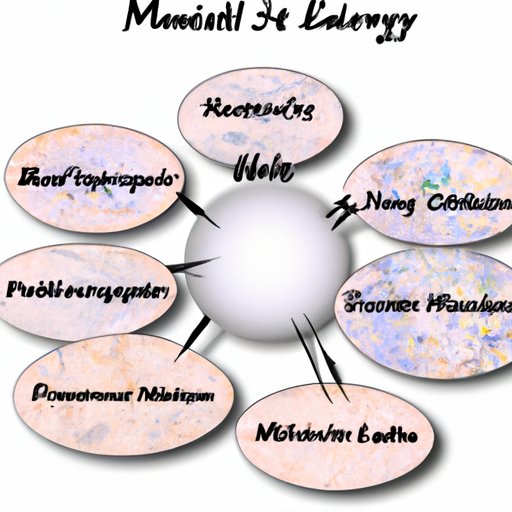Introduction
Minerals are naturally occurring elements that are found in the Earth’s crust. They are necessary for human health and play an important role in many bodily processes. While some minerals are required in larger amounts than others, all are essential for wellbeing. In this article, we explore the reasons why we need minerals, their benefits, sources, and the environmental effects of mining them.

Mineral Deficiencies and Human Health
Minerals are essential nutrients that the body needs to function properly. A mineral deficiency occurs when the body does not get enough of certain minerals. This can lead to a wide range of symptoms, from fatigue and muscle weakness to impaired growth, digestive problems, and weakened bones.
According to the World Health Organization (WHO), “deficiencies in essential vitamins and minerals are among the most common nutrient-related causes of ill health worldwide.” Research has shown that mineral deficiencies can be caused by poor diet, inadequate absorption, or increased excretion of minerals due to certain medical conditions. For example, people with gastrointestinal disorders may have difficulty absorbing minerals, while those with kidney disease may excrete too many minerals through their urine.
The Role of Minerals in the Body
Minerals are involved in many metabolic processes in the body and are essential for optimal health. They help to regulate hormones, maintain fluid balance, build strong bones and teeth, and support the immune system. Some minerals also act as antioxidants, protecting cells from damage caused by free radicals.
Common minerals include calcium, magnesium, phosphorus, potassium, sodium, and zinc. Calcium is important for bone health, phosphorus helps to form strong teeth, and potassium helps to regulate blood pressure. Magnesium is essential for energy production and protein synthesis, while sodium and zinc are involved in nerve and muscle function.

Benefits of Supplementing with Minerals
Supplementing with minerals can provide a number of health benefits. Studies have shown that adequate intake of minerals can improve the immune system, reduce the risk of chronic diseases, and increase bone health. For example, research published in Frontiers in Nutrition found that taking a daily multivitamin and mineral supplement was associated with a reduced risk of cancer and cardiovascular disease.
In addition, studies have shown that taking mineral supplements can help to prevent or treat certain mineral deficiencies. For instance, a study in the American Journal of Clinical Nutrition found that taking iron supplements can reduce the risk of anemia in pregnant women.

How to Ensure Adequate Mineral Intake
The best way to ensure adequate intake of minerals is to eat a balanced diet that includes a variety of fruits, vegetables, whole grains, legumes, nuts, and seeds. These foods contain a wide range of minerals, including potassium, calcium, magnesium, and zinc. Eating a variety of these foods on a regular basis can help to meet your daily mineral requirements.
In addition, taking mineral supplements can help to boost mineral intake and prevent or treat mineral deficiencies. However, it is important to speak to your doctor before taking any supplements, as they can interact with medications and other supplements.
Different Types of Minerals and Their Uses
There are two main types of minerals: macronutrients and trace elements. Macronutrients are minerals that the body needs in large amounts, such as calcium, magnesium, and potassium. Trace elements are minerals that the body needs in small amounts, such as iron, zinc, and selenium.
Macronutrients are involved in many metabolic processes, such as energy production and muscle contraction. Trace elements are essential for a wide range of functions, including enzyme activity, red blood cell formation, and immune system function.
Environmental Effects of Mining Minerals
Mining minerals can have a negative impact on the environment. It can cause pollution, habitat loss, and potential health risks for nearby communities. For example, according to a study published in Environmental Science & Technology, mining operations can lead to air and water pollution, which can contaminate drinking water and harm aquatic ecosystems.
In addition, mining activities can lead to deforestation and soil erosion, which can disrupt local ecosystems and reduce biodiversity. Furthermore, there is a risk of workers being exposed to hazardous chemicals and dust particles, which can lead to long-term health problems.
Conclusion
In conclusion, minerals are essential for maintaining good health. They are involved in many metabolic processes, from energy production to immune system function. Adequate intake of minerals can help to reduce the risk of chronic diseases and improve overall health. To ensure adequate intake of minerals, it is important to eat a balanced diet and take mineral supplements, if necessary.
However, mining minerals can have a negative impact on the environment. It can lead to pollution, habitat loss, and potential health risks for nearby communities. Therefore, it is important to recognize the importance of minerals and their potential environmental effects.
(Note: Is this article not meeting your expectations? Do you have knowledge or insights to share? Unlock new opportunities and expand your reach by joining our authors team. Click Registration to join us and share your expertise with our readers.)
